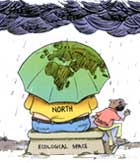
 Equal rights to the atmosphere
Equal rights to the atmosphere
Equity is a prerequisite for any global agreement, particularly when dealing with the pollution of a global common property resource, such as the atmosphere. Discussions on global warming and climate change, however, threaten to put unequal burden on the nations of the world.
The Centre for Science and Environment campaigns for equal rights as the basis for climate negotiations, which will form a model for sharing common property resources in future.
|
Graduation and deepening: moving climate policy forward
By Axel Michaelowa
Climate policy is a titanic clash of interests. Emitters of greenhouse gases (GHG), both rich and poor, do not want to bear costs of reducing emissions. Consequently, implementation of climate policy measures on a national scale has often been stalled. Rich and poor alike want to protect themselves against the impact of climate change – but the latter do not have the means to do so. Thus international climate negotiations will become the world trade negotiations of the future. And like those, they will fail from time to time. But they will never be derailed completely because the alternative is a "fortress world" of the rich. Fortresses have never managed to hold out indefinitely…
Read more
|
|
|
CoP-9 in Milan: A Fashionable Trend for Climate Agreements
By Agus P. Sari
What will we see at the ninth conference of parties (CoP-9) to the UN climate change convention? Three things come to my mind. First, and the most anticipated one, is the set of rules for land use, land-use change, and forestry (LULUCF) projects in the clean development mechanism (CDM); second, adaptation to climate impacts; third, whether and when Russia will ratify — determining entry into force of the Kyoto Protocol; and fourth, a possible start of a discussion on the future of the international regime on climate change after 2012.
Read more
|
|
|
Climate Change Negotiations: from New Delhi to Milan
By Miquel Muñoz
The Ninth Conference of the Parties to the United Nations Framework Convention on Climate Change (UNFCCC), also known as COP-9, is being held in Milan, Italy. The previous conference, COP-8, took place in New Delhi from October 23 to November 1, 2002. Can the lessons from New Delhi be applied to Milan?
Read more
|
|
|
Climate Negotiations: Time for a Rethink
By Adil Najam and William Moomaw
Let’s face it: the global climate change regime is stuck in a rut. It is unlikely that things will change dramatically at the forthcoming conference of the parties (CoP-9) of the United Nations Framework Convention for Climate Change (UNFCCC). Of course, it is possible that Russia could surprise everyone by deciding to ratify the Kyoto Protocol. It is possible, but not probable.
Read more
|
|
|
The KP Game
By Gurmit Singh
The ratification of the Kyoto Protocol (KP) has become a great game between the Russian bear and the EU/Japan, very much reminiscent of the Great Game played between the same bear and the British bulldog in the late 19th century over Northwest India & Afghanistan. Of course, the new entrant is Uncle Sam, whom everyone is trying to cajole & pacify.
Read more
|
|
|
The Kyoto Protocol Battlefield of Hegemonic Struggles in World Politics
By Hermann E. Ott
It seems that the European Union (EU) has lost the fight with George W. Bush. No, I am not referring to the Transatlantic struggle over the legitimacy of the war in Iraq and over UN supremacy in rebuilding the devastated country. I am talking about the battle over the right answer to the climate crisis. Now that Russian President Putin has missed the opportunity of the Moscow World Climate Change Conference to forward the ratification bill to the Russian Parliament, prospects for the Kyoto Protocol to enter into force have worsened considerably.
Read more
|
|
|
A Call for Developing Country Leadership
By Tom Athanasiou
The events of the last few years – 9/11, the US invasion of Iraq, and, on the climate front, the emerging recognition that the Earth's overall climate sensitivity is likely to be quite high – should first of all prod us to realise that our situation is deadly serious.
Read more
|

 Equal rights to the atmosphere
Equal rights to the atmosphere
Share this article